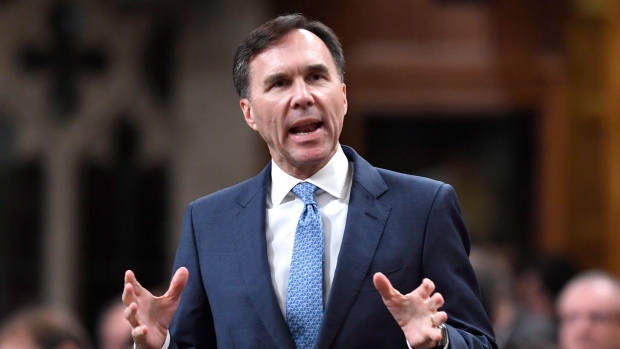Nov 20, 2017
Morneau takes heat over pension bill as opponents allege conflict of interest
The Canadian Press

OTTAWA -- Bill Morneau faced attacks from both sides of the House of Commons on Monday for his involvement in a pension bill that opponents allege puts the finance minister in a clear conflict of interest.
Ethics commissioner Mary Dawson has launched a formal examination of Morneau's work to introduce Bill C-27, which critics insist will benefit his former company in which he owned some $21 million worth of shares.
After the ethics controversy erupted, he vowed last month to sell off his holdings in Morneau Shepell, a human-resources company he built with his father, and place his other considerable assets in a blind trust.
On Monday, after a week spent away from Ottawa in their ridings, political foes renewed their focus on the issue during question period -- the first chance they have had to question Morneau on Dawson's decision to take a closer look at whether the finance minister had a conflict of interest.
Conservative House leader Candice Bergen said Dawson's probe of Morneau's involvement in the pension bill is just the latest examination related to the Liberal government.
In one example, she mentioned Dawson's ongoing investigation of Prime Minister Justin Trudeau's family holiday as a guest of the Aga Khan, a wealthy philanthropist and hereditary spiritual leader. Trudeau has insisted the Aga Khan, whose foundation has received millions of dollars in federal funds for its international development work, is a family friend.
"With all of these investigations, investigations, investigations -- how can these Liberals be trusted?" Bergen said.
New Democrat MP Nathan Cullen said the Liberal government's pension bill is not only an attack on workers' pensions, it's a "massive" conflict of interest involving Morneau.
"It seems this prime minister will walk across broken glass to defend his ethically embattled finance minister, but won't lift a finger to help out Canadian pensioners," Cullen said.
In defending Morneau, Trudeau accused political opponents Monday of trying to undermine the integrity of the federal ethics watchdog.
Trudeau called opposition criticism as nothing but "cheap shots" and "mud-slinging."
Morneau has been facing intense criticism about his integrity for weeks now after information surfaced showing that, based on Dawson's advice, he had not divested or placed those shares in a blind trust.
"I will continue to work with the ethics commissioner to make sure that her examination is completed," Morneau said Monday.
"Now that I've sold all my Morneau Shepell shares, and made a large donation to charity, I'm looking forward to continuing these efforts on behalf of Canadians."
The latest criticisms came Monday after the Canada Post Pension Advisory Council revealed it had alerted Dawson in a letter back on Sept. 18 that Morneau could be in a conflict of interest over the pension bill and its potential benefits for Morneau Shepell.
Dawson, however, only opened an examination earlier this month after the media reports shed light on the issue.
Peter Whitaker, an elected official on the council, said Monday that Dawson's office only responded to the letter after the media started asking her questions about the message.
"It's frustrating," said Whitaker, who would like to see Bill C-27 abandoned.
He added that Morneau's decision to sell his shares was "too little, too late" and insisted the bill is now tainted.
Bill C-27 would amend the Pension Benefits Standards Act so that federally regulated companies and Crown corporations would have the option of setting up target benefit plans for their employees, instead of defined benefit plans.
Opponents, including unions, say the bill would erode the stability of workers' defined benefit plans, while proponents say the changes would give employers more flexibility in helping their employees plan for retirement.
Morneau introduced the bill in October 2016, but it has languished on the order paper since then.







